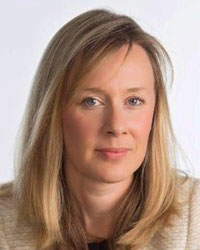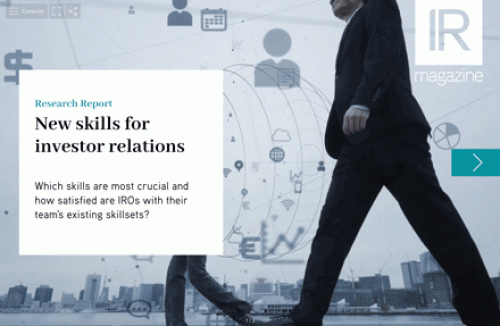Sarah Elton-Farr joined pharmaceuticals giant from Shire in January 2017
GlaxoSmithKline (GSK) has poached Sarah Elton-Farr, Shire’s IRO of nearly six years, to head its investor relations department.
 Elton-Farr studied chemistry at Imperial College, also spending a year at École Polytechnique in France. Upon graduation, she joined the finance trainee program at GlaxoWellcome and subsequently worked as an equity analyst covering the pharmaceuticals sector at Salomon Smith Barney and Credit Suisse.
Elton-Farr studied chemistry at Imperial College, also spending a year at École Polytechnique in France. Upon graduation, she joined the finance trainee program at GlaxoWellcome and subsequently worked as an equity analyst covering the pharmaceuticals sector at Salomon Smith Barney and Credit Suisse.
She also spent seven years working on forecasting and analysis for the pharmaceutical industry at Insight Pharma before moving into IR at Shire in 2011.
How is your new team set up?
We have 12 people in total, which may seem a lot but for a global diversified business such as GSK, there is a lot to stay on top of. We have four people in the US (including administrative support), as a large portion of our investor base and our commercial operations are centered there, and eight people in the UK.
We have team members who take the lead on various parts of the business: vaccines, consumer health, respiratory, HIV, R&D and finance, and also a team member responsible for looking after ESG investors. We should all be able to talk about all parts of the business to investors externally, but internally I think it’s important that the business has a consistent point of contact within the team. The team members who take the lead on each area are responsible for gathering quarterly briefing information, briefing management ahead of investor events, developing external materials relating to their area (presentations, and so on) and co-ordinating investor meetings.
Which IR challenges do you believe are specific to the pharmaceutical sector?
I’ve never worked in IR outside of pharma so it’s a little difficult to comment, but my sense is that within pharma we spend perhaps less time than in other sectors focused on the pure financial questions. I’d say I spend the vast majority of my time in meetings discussing our products (our medicines, vaccines and consumer healthcare products) and our pipeline rather than on the pure financial elements of the company.
Depending on the therapeutic category we’re talking about, there can also be a lot of discussion about market dynamics: prevalence, diagnosis rates, how patients access care, what the reimbursement environment is like, and so on. This means the traditional finance route into IR doesn’t necessarily apply within pharma and we have team members who have a background in R&D or communications, as well as finance.
Having a science background can be helpful, but I think as long as you’re not afraid of the science and have an interest and curiosity around it, it’s not a necessity. That said, you certainly need the ability to understand complex scientific concepts and discuss them at multiple levels: from discussions with healthcare specialists who may have a PhD in that area to generalists who just need to understand what matters from an investment perspective.
And you do need a relatively high level of technical knowledge, not just from a science perspective, but also on how regulators work, patent regulations, how different markets work with respect to payers, and so on, before you can talk credibly with experienced sell-side analysts.
What are the plans for GSK’s IR program this year?
We have a new CEO, Emma Walmsley, who started in April, so a lot of our activity this year is centered on that. Fairly typically in a year with a CEO transition, we’ve spent the first few months giving our biggest shareholders an opportunity to meet with Emma and get to know her and for her to get to know them and listen to their thoughts on our business.
Other than that we’ve adopted a fairly light touch with respect to IR events during the first half of the year. After we’ve updated the market with our priorities for the business in the summer, we’ll resume what I’d call a more ‘normal’ IR program, with management participation in roadshows and conferences. Our goal is to get a greater number of the management team out and about meeting with investors, which has the dual benefit of keeping our investors on top of our story as well as helping a broader swathe of management gain insight into our investors and their views. Management also gets a first-hand external perspective on how we are performing.










